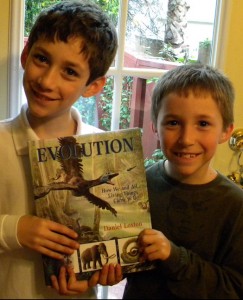There is No Debate Over Evolution

A recent event not included in my last post, but one about which I am very excited, is the release of Daniel Loxton’s book Evolution: How We and All Living Things Came to Be. It is a book aimed at children ages 8 to 13 and covers the basics of natural selection and speciation in the most clear and concise language I have found on this topic so far.
Perhaps I am a little biased as I expected a great book, given his track record writing-wise, but even I was surprised by the clarity and creativity of some of the examples. My 9 year old son was looking forward to the illustrations. Daniel sometimes shares his works in progress and both of my art-minded kids (their father’s influence) think that Mr. Loxton is awesomrific. Of course the illustrations did not disappoint, but he was even more intrigued by the discussion of natural selection in a grove of trees. I thought my son understood natural selection quite well, but it seems that his 3rd grade lessons focused on biodiversity and the results of selection.
I was impressed with a discussion of the often-forgotten limits and compromises in evolution, but that is a lesson my boys learned quite well from playing Spore™.
My 12 year old son, who is obsessed with man’s origins, wrote a review. Here it is, unedited:
Evolution: How We and All living Things Came to Be is a amazing book. It puts a difficult concept into easy to understand words. Digital art recreates dinasaurs, fossils, and prehistoric creatures right on the page. Analogies, comparisons, and visualization helps a young reader grasp this concept. This book directly tackles questions about evolution. In conclusion, cold hard facts and mind-boggling illustrations laced with superior analogies makes Evolution: How We and All living Things Came to Be a must for the young scientist!
It should be obvious by now that we love the book and highly recommend it. It doesn’t sound like something that skeptics would disagree about, does it?
Skepticism activists and advocates disagree often and there are a few topics guaranteed to heat up the room. The most volatile is libertarian-style fiscal conservativism, but a close second is the mix of skepticism with atheism. This is a multi-faceted issue with several questions whose answers are debated, the most contentious of which is, “Can science address questions of faith?”
This seems like a simple question, but it is it not. It is really a philosophical question and a rather complicated one. As such, I do not plan to answer it in this post. What I will say is that insulting people of faith by calling them irrational (what they’ll hear: stupid) is a great way to get their attention, but it would likely ensure that efforts to convince them of the merits of critical thinking are wasted. I also believe that the most important property of science is its lack of arrogance, the open-mindedness that comes with the knowledge that our conclusions depend on the infallibility of a few fundamental principles we assume are true. To deny that 100% certainty is not possible is dogmatic, unreasonable, and anti-science. For that reason, my philosophical position on the matter is irrelevant. I would not claim to know the absolute truth. Note that open-mindedness should not be taken as an agnotistic stance. I am quite certain that there is no God. I am simply not 100% certain of anything.
So, what does this have to do with a kid’s book on evolution?
The book includes an answer to the question, “What about religion?”
In his answer, Daniel makes a clear statement that science does not address such questions, nor does it interpret knowledge in a spiritual way. This answer is not an answer at all, but a caveat which absolves science of the responsibility of placing value judgments on its discoveries. This is another extremely important property of science. It is concerned with finding truths, regardless of how ugly or unpleasant those truths are. “Passing the buck” is not a matter of dodging the question. It is a matter of preserving the objectivity of science.
What Daniel has done is to immediately dispel any notions that the content of the book must destroy ones’ faith. For that he has taken a good deal of criticism, but he has also received a good deal of support. Although I am thoroughly disgusted that such a section is necessary, I think it was a wise decision. What we need to do is focus on the fact that there is no debate over the theory of evolution, regardless of how much proponents of misguided-design kick and scream about it. Since that theory is so obviously true, the question of religion is moot.
Many have blogged about this issue including (since the book was released) Daniel himself. Each time it comes up, the comments of the blog which breaches the subject become a bit of a war zone.



